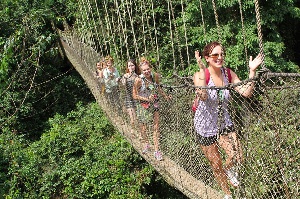 File photo of tourists on the canopy walk at Kakum National Park
File photo of tourists on the canopy walk at Kakum National Park
Nearly 44 percent of both local and international tourists have rated Ghana as an expensive destination, compared to those who claimed it was affordable, according to the 2023 Ghana Tourism report.
Out of this group, 7.85 percent of tourists from the US, UK, Nigeria, and domestic sources rated Ghana as a very expensive destination, with an additional 36.13 percent considering it expensive.
Fifteen percent indicated that Ghana is less expensive, while 18 percent said it is not expensive.
The remainder described the country as normal in terms of purchasing power parity compared to countries in the sub-region.
The report's findings reveal that with nearly 20 taxes and levies imposed on patrons in the tourism and hospitality industry, the country has become an expensive tourist destination in the West African sub-region compared to other similar destinations on the continent.
Though ranked by Tripadvisor as the most visited country in West Africa, Ghana’s tour packages and hotel rates remain very high compared to others in the region.
For instance, a significant portion of tourists' budgets, almost 80 percent, is allocated to accommodation, a sub-sector known for its high costs. According to the 2023 Ghana Tourism Authority (GTA) report, accommodation accounted for the highest average spending of tourists, nearly US$500 weekly, especially in non-star rated facilities.
The Ghana Hotels Association has repeatedly pointed out that the high cost structure involved in setting hotel rates in the country is a significant challenge. The association is currently grappling with approximately 20 different taxes and levies, which significantly affect pricing in the hospitality industry.
Currently, hotels are contending with industry taxes, including NHIL, VAT, GETfund, COVID-19 levy, GTA levy, EPA Levy, FDA levy, MMDAs levy, Fire Service levy, 1 percent tourism levy, SSNIT for staff, data protection levy, BOPs levy, property rates, suitability report levy, GHAMRO levy, among others.
These taxes all impact the sector’s pricing mechanisms. Despite the high prices, Ghana aims to increase tourist arrivals to around two million international tourists in 2024, compared to the 1.1 million recorded last year.
In 2023, international tourist arrivals reached 1.1 million, a 25 percent increase from the previous year. US nationals constituted the largest group of participants with 39 percent, followed by Ghanaians residing abroad (33 percent), with the UK (16 percent), Nigeria and Germany (6 percent each), and South Africa (4 percent).
With more than 37 international airlines operating through Kotoka International Airport and niche tourism potentials such as forts and castles, the GTA holds the view that the country remains an attractive destination.
However, tourism sector stakeholders are concerned about the prospects amid the consistent perception of the country as an expensive destination.